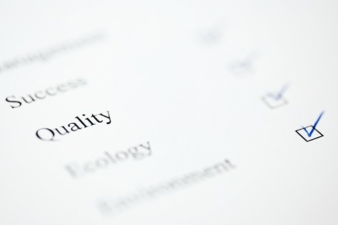19/01/2016 — auf Deutsch lesen
What is quality?
This short and at first glance seemingly straightforward question has been niggling me for some time. The reason is this years series on “Quality Assurance along the Textile Chain”. After three successful series: “China, a country on the move” in 2013, “The Fashion Industry in Transition” in 2014 and “The Global Textile Strategy” last year, we have decided to focus this year on the topic of quality.
It soon became clear to me that the simple “Q” word is far from easy to understand. “What do you actually mean by good quality?” a colleague recently asked me, catching me somewhat off-guard. “Hmm, the best materials, the best workmanship, excellent durability.” Im not totally happy with my answer as it immediately begs the question as to what is meant by the best. To find some clarity, I do what nearly everyone else does these days. I google the word “Quality” and sure enough, Im showered with results. I read, for example, that within the realm of total quality concepts, the term quality can extend across entire companies, as a comprehensive variation on Quality Management. So I think to myself that this definition comes quite close to our topic. I read on and am told that quality was traditionally considered a characteristic of products and services, with customer needs receiving top priority. Today, quality also embraces the demands of staff and investors as well as legal requirements, against which the overall quality of a company is measured. Garvins definition is interesting as it identifies five different approaches to quality. Customer-oriented quality, for instance, involves meeting all customer expectations attached to a product in compliance with the definition of quality as per ISO 9000:2005. This roughly corresponds to the comments by our interviewee Elgar Straub, Managing Director of German engineering association VDMA Garment and Leather Technology, who introduces our new series on quality (Part 1, page 33). He defines the highest quality standard as “achieving what is technically possible whilst considering the needs and wishes of our customers”.
Interestingly, Theodor Heuss, the first President of the Federal Republic of Germany from 1949 to 1959, held a widely acknowledged speech before the German Association of Craftsmen in Stuttgart in 1951 with exactly the same title: “What is Quality?” He said, among other things: “Quality is fundamental to a companys survival, after all, those that persist and thrive are the ones that reject a drop in quality whereas those who falter are the ones who allow quality to slide. … Customers tend to have exceedingly good memories.” In answer to the question, “What is quality?” he concludes: “Quality is all that is respectable.” And what is your understanding of this term? We would be interested in hearing your views. Simply write to:
Iris Schlomski





